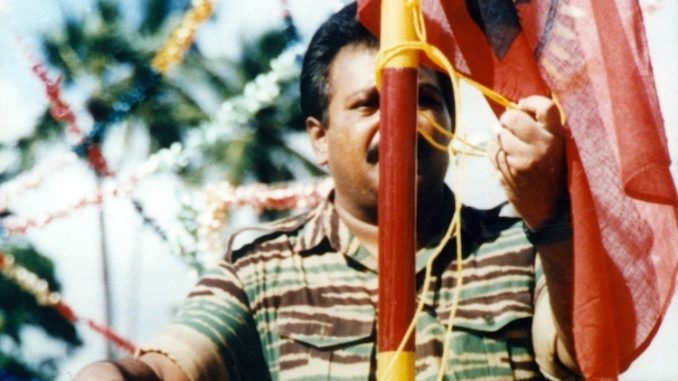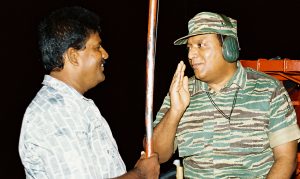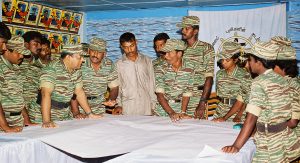

Family life and the beginning of the movement

Thiruvenkadam Velupillai of Thirumeniyar family married Paarvathy of Nagalingam family. 26th November they have a babyboy. They named him Prabhakaran.
Prabhakaran was the youngest child born in that family. Pirabakaran has one elder brother and two elder sisters. All of them are happily married and settled down in life. One of his sisters, Vinothini Rajendram is in Canada. The other sister and brother are living in Denmark.

Prabhakaran’s father served under the Sri Lankan government as a District Land Officer for several years.
Prabhakaran had his education up to 10th grade at Sithamparam Vidyalayam in Oorikkadu, Valvettithurai.
In those days, the sole ambition of children from affluent and middle class families was to receive good English education and then seek employment abroad or secure employment in the government. However, from his childhood days Pirabhakaran’s way of thinking was completely different.
When he travelled with his father to the other parts of Sri Lanka, he saw for himself how the Sinhalese police officers ill-treated innocent Tamil people by kicking and beating them. Such incidents caused shock and pain and left deep scars in his psyche.
Especially, the first major genocidal attack against the Tamils during 1958 affected his mind profoundly. Still in his teens, he heard numerous heart-aching stories of inhuman and brutal murders of Tamils by Sinhalese goon squads and thugs.
He heard at first hand from a widowed mother who is wellknown to his parents the anguish and pain she suffered. How Tamil children were killed by heartless mobs by throwing them into cauldrons of boiling tar. How a Hindu priest was burnt alive at a temple in Panadura. Therefore, when he came to know how the unfortunate Tamils have been at the receiving end of horrible attacks at the hands of Sinhalese goons, he developed deep sympathy, love and a firm resolve to defend the defenseless the Tamil people.
Therefore, he perfected an irresistible urge in his mind to free the Tamil people from the clutches of the oppressive Sinhalese government. He came to the firm and resolute conclusion that the only way to confront the Sinhalese government which used military might against the defenseless and innocent Tamil people is through armed struggle.
Therefore, during his student days, he and his friends learnt the art of making improvised hand grenades. On one such occasion, a grenade exploded accidentally and he received burnt marks on his leg. After medical treatment, the burnt area became black. This earned him the nickname ‘Karikalan’ (person with a blackened leg) when he was still a young lad.

The standardization system introduced by the Sinhala government in 1971 acted as an obstacle against Tamil students gaining entry to Universities after finishing high school. Prabhakaran who studied up to 10th grade could not continue his studies because of his involvement as a liberation fighter.
Prabhakaran parents were completely unaware of his clandestine activities. Nevertheless, the opportunity for the parents to know of his clandestine revolutionary activities came knocking at the door on its own.
One day a posse of police officers came in search of Prabhakaran. They knocked at the front door of his house at the unholy hour of 3 a.m. in the morning. Immediately on hearing the knocks, Prabhakaran immediately knew it is the police had come in search of him. Sensing trouble, he vanished through the back door into the darkness of the night without anyone’s knowledge.
Prabhakaran’s mother opened the door and was startled to see several police officers in khaki uniform standing in front of the house. She was shocked because at that time she was unaware of Prabhakaran’s involvement in any ‘clandestine movement’. Finally, after a thorough search of the house a disappointed police went back empty handed failing to apprehend Prabhakaran. He was only 19 years old at that time and he never returned home thereafter.
When his father came to know of his involvement in revolutionary activities, he went to Prabhakaran’s hide- out and brought him back home.
Prabhakaran told his parents “I will never be of any use to you or to other members of the family. Let there be no trouble for you because of me. Please allow me to go my own way. In future never expect anything from me.” So saying he left the house. Then he plunged himself fully in the clandestine activities of the movement. He became a full time activist living under ground and moving from place to place to escape arrest by the police.
The birth of the “New Tamil Tigers”
During the early part of 1970, strong repressive measures unleashed by the government against Tamils and the blatant discrimination perpetuated against them in all spheres of life created a strong wave of resentment among Tamil youths. They were itching to launch some retaliatory action against the Sinhalese chauvinistic government. Neither the Tamil political parties nor the Sinhalese leftist organizations understood the simmering mind-set of the Tamil youths.
The Tamil youths thought that there were no Tamil political leaders or organizations to stand up and fight on behalf of the oppressed Tamil people. Although the Tamil leaders engaged themselves in various non-violent struggles for more than 30 years, they were treated like outcasts by the government. No one listened to their protests in Parliament. Their protests echoed like cries in the wilderness.
The leftist parties, which became victims of Sinhalese chauvinism after 1956 worked against the Tamils. Therefore, they too completely ignored the political struggle of the Tamils. Therefore, the Tamil youths were not prepared to trust these leftist parties as well.
Under these circumstances, a student movement was started in 1970 under the name “Thamizh Manavar Peravai” (‘Tamil Students Union’). The TSU brought together all the Tamil students and mounted several protest demonstrations, rallies and processions against standardization to university admissions introduced by the government. The TSU became a powerful force among the Tamil students. Tamil youths gradually began to realize that only through an armed revolutionary struggle that Tamils could liberate themselves from the tyranny of Sinhalese hegemonic rule.
The TSU grew to become a very strong organization. Prabhakaran was in the forefront as the leader of the militant wing. As he was the youngest person in that group he was fondly called ‘Thamby’ (younger brother) by other members of the group. Even today, there are people who call him by this name. At the beginning, these young men learnt the art of making hand grenades and using firearms all by themselves. There were about 25 young men in this militant group, all of them close associates of Prabhakaran.
During this time to show their opposition to the government, 4 youths under the leadership of Prabhakaran decided to set fire to a government owned Ceylon Transport Board (CTB) bus. However, half way through fear the other three ran away. Only Prabhakaran who was only 16 years old at that time boldly set fire to the bus and returned. Prabhakaran’s boldness earned the admiration of every one without exception. Those members of the group who were older than him admired Prabhakaran’s bravery and his ability to execute successfully all the difficult tasks assigned to him. All members reposed confidence in Prabhakaran who became symbolic of Tamil militancy and forerunner of Tamil militant movement.
At the same time, the Sinhalese government, which was closely monitoring the activities of the TSU, attempted to suppress it by using brute force. Some members of the TSU were arrested and tortured by the police. Unable to bear the torture, a few of them broke down and spilled the beans. In the process, they unwittingly betrayed their colleagues to the police. Then the Sinhala police started to hunt down members of the militant group. They arrested many of them, locked them in prisons and tortured them. It was during this period the 4th Storey building in Colombo Fort became famous for torturing Tamil youths. Not wishing to take unnecessary risk, Prabhakaran went over to Tamil Nadu, India.
Prabhakaran did not stay long in Tamil Nadu. He returned to Tamil Eelam during the early part of 1972. There was an urge among the various revolutionary youths who remained scattered for a revolutionary leadership to head a strong revolutionary movement wedded to revolutionary political philosophy. It is under these circumstances the New Tamil Tigers was launched by Prabhakaran in the middle part of 1972. He was only 17 years old at that time. The movement was organized with very strict code of conduct and discipline from the very beginning.